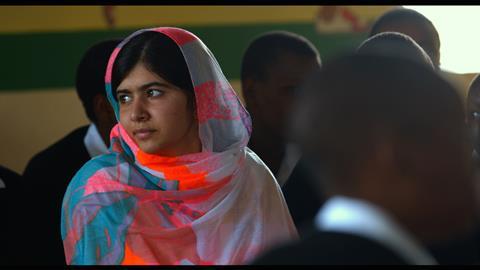Producers Walter Parkes and Laurie Macdonald reveal why they changed tack to make Davis Guggenheim’s He Named Me Malala as a documentary rather than narrative feature.

When former DreamWorks’ studio heads Walter Parkes and Laurie Macdonald first secured the rights to Malala Yousafzai’s autobiography He Named Me Malala at pre-publication stage, their intention was to adapt it into a narrative feature.
They had the approval of the Yousafzai family to take that approach. But when the pair flew to the UK to meet the family in Birmingham — where they had relocated six months earlier as Malala recuperated from a Taliban gun attack in Pakistan’s Swat Valley — it became clear she should be the star of her own story.
“I don’t think it hit us until the next day just how extraordinary Malala was,” says Parkes, who along with his wife ran DreamWorks’ motion-picture division for 14 years.
Having left the studio to strike out on their own as independent producers, Parkes and Macdonald had launched a $10m development fund in 2010 with Image Nation Abu Dhabi, which was on board to finance a Malala biopic.
Before discussing their change of heart with Image Nation and the Yousafzais, namely to chronicle in documentary form Malala’s journey from outspoken local advocate for girls’ education to Nobel Peace Prize winner, Parkes and MacDonald enlisted Davis Guggenheim, the documentary maker behind An Inconvenient Truth and Waiting For Superman. He travelled to the UK to win over the family.
“She has a tremendous sense of purpose. I think that comes from having almost died” - Davis Guggenheim
“He was the key,” says MacDonald of convincing the Yousafzais. “He makes you feel safe, and he only makes documentaries about subjects that he loves as opposed to negative underbelly ones.”
With everyone on board, a complicating factor emerged: that very first meeting with Malala took place in early May 2013 and nine weeks later she was addressing the United Nations — her first public speaking appearance since being shot on a school bus. “We knew we had to film the UN, which is the conclusion of the movie it turns out,” says Parkes. “We were fortunate to have Image Nation as our partner. They agreed to let us just start filming even though we didn’t have a budget, we didn’t have a schedule.”
Image Nation later brought Jeff Skoll’s social activist-minded Participant Media on board to help fund the project.
Following the family around the globe, from Birmingham to Kenya to Jordan to Boston, Guggenheim built up a deep level of trust with the Yousafzais, gaining intimate insights into the family’s dynamic. The director captures a teenage girl with the same preoccupations as most — boys, exams, annoying younger brothers — but whose life has taken on a globally influential dimension. “She has a tremendous sense of purpose,” says Guggenheim. “I think that comes from having almost died.”
The director was especially struck by the dynamic between Malala and her father, Ziauddin. “There was something mysterious about it,” says Guggenheim, explaining his decision to explore the personal rather than geo-political aspects of Malala’s story. “Was he pulling the strings? Was she really so extraordinary? I try to ask the question throughout the movie but the audience has to decide.”

























No comments yet